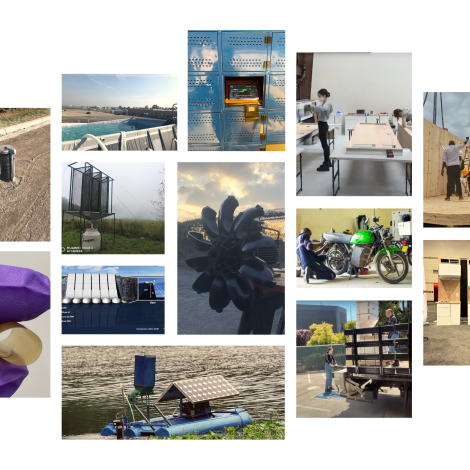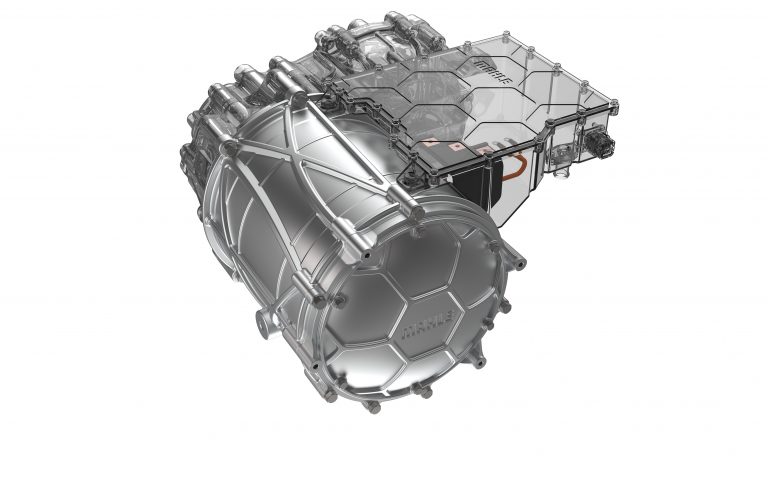A membrane to replace mercury in Amazon gold mining operations, pre-fabricated units that convert vacant commercial buildings into affordable housing, and a battery-swapping startup for electric motorcycles made this year’s list of Promising Prototypes.
Each year we build our lists of prototypes to watch, combing through technologies in design competitions and incubators, and seeking recommendations from our global network. This year’s list includes winners of the Innovation Showcase, hosted by our umbrella organization the American Society of Mechanical Engineers (ASME ISHOW), and the Artisanal Mining Grand Challenge: The Amazon, among others. We also put the question to our network of design and engineering experts for recommendations.
One rule: The design must be in development, or it must have recently undergone an upgrade. These are promising prototypes to watch in 2023.
See what we were watching last year in E4C’s Promising Prototypes of 2022
BuildX mass timber
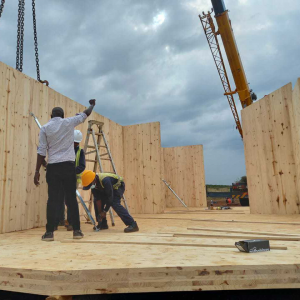 Mass timber are engineered wood products designed as high strength and lightweight replacements for concrete and steel in the construction of large, multiple-story buildings. BuildX, based in Nairobi, Kenya, is developing mass timber and supply chains for their materials in East Africa. The goal is to reduce the carbon footprint, and eventually the cost, of construction in the region.
Mass timber are engineered wood products designed as high strength and lightweight replacements for concrete and steel in the construction of large, multiple-story buildings. BuildX, based in Nairobi, Kenya, is developing mass timber and supply chains for their materials in East Africa. The goal is to reduce the carbon footprint, and eventually the cost, of construction in the region.
“Mass timber offers performance characteristics superior to high-carbon options like concrete and steel, including a greater strength-to-weight ratio, faster build times, better fire performance, and even health and wellbeing benefits,” says James Mitchell, Co-Founder and CEO of BuildX.
The first buildings made with cross-laminated timber, a mass timber product, have gone up in Nairobi, and BuildX has landed partnerships with agroforestry companies to provide a lumber supply that includes FSC-certified sustainable pine. The arrangement brings the costs down for mass timber “so that builders can get rich building better while not denuding forests,” says Avery Bang, Senior Principal at the Mulago Foundation, who recommended BuildX’s mass timber as one of this year’s Promising Prototypes.
ChemFinity’s Porous Polymer Sorbents for cleaner gold mining
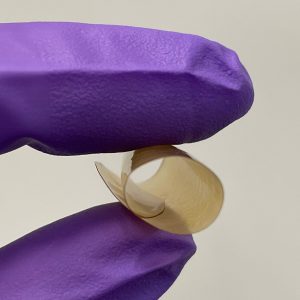
Mercury can stick to tiny specks of gold, a process called amalgamation, trapping the gold and settling out of the dirt and rocks in waterways where gold particles can be found. Artisanal and small-scale gold operations in the Amazon use mercury in sediment gathered in waterways, then burn it off to collect the gold. While great for finding gold, mercury contaminates the water, poisons the wildlife and pollutes the air when it is burned.
ChemFinity is developing a porous polymer sorbent, a membrane that traps gold particles to replace mercury in the process. The membrane can also filter mercury out of contaminated water, elevating this innovation to two potential roles: A tool for cleaner mining as well as environmental clean-up.
in 2022, ConservationX Labs hosted the Artisanal Mining Grand Challenge: The Amazon to promote the development of cleaner mining methods, and E4C supported the competition and is an implementation partner for the Amazon CoLab incubator. The US-based ChemFinity took one of two grand prizes awarded.
“We are optimizing scale-up manufacturing procedures for our membrane and sorbent materials, so that more people can benefit from their unprecedented capabilities at a larger scale. We are also developing small pilot prototypes of our technology that we will use for testing with communities who could benefit from them,” Adam Uliana, a ChemFinity Co-Founder, told E4C.
Learn about the 13 finalists in the Artisanal Mining Grand Challenge: The Amazon
Darcy Solutions innovative heat pumps
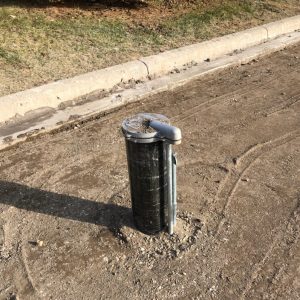
Darcy Solutions is developing a new energy production system that couples geothermal technology with heat pumps, drawing energy from the temperature difference between groundwater and the surface. Where typical groundsource-coupled heat pumps may use the underground temperature of solid earth, this startup has tapped into the temperature-regulating aspect of water. The result is lower costs, a smaller footprint, and geothermal heat pump systems that can operate in sites that are not suitable for traditional groundsource systems.
Darcy’s patent-pending technology improves system efficiency, says Lauren Magin, the startup portfolio manager at the US National Renewable Energy Lab, who brought the enterprise to E4C’s attention. NREL worked with Darcy Solutions while the startup was enrolled in the Wells Fargo Innovation Incubator (IN2) program, which provides technical assistance to cleantech startups.
The enterprise is in a starting phase with plans to expand throughout the US upper Midwest where it is based.
“We currently have three installed systems, and we have plans for an additional 10-15 systems this year. We’re focused on commercial and industrial markets, so we measure scale based on HVAC system tonnage. With these additional installations we’ll have over 1,000 tons of installed system capacity,” Brian Larson, Co-Founder and CEO told E4C by email.
Kit Switch pre-fab units for affordable housing

Kit Switch is preparing to pilot its pre-fabricated kits that convert vacant commercial buildings into affordable housing.
The kits can make use of some of the 17 billion square feet of unused non-residential building in the United States where Kit Switch is based. With the modular kits, commercial spaces can become affordable and reconfigurable housing.
“This spring will mark the start of our pilot roll outs, after which we will measure our scale in number of people housed and tons of CO2 mitigated through the use of Kit Switch products,” Armelle Coutant, Co-Founder of Kit Switch, told E4C. “Potential partners can view our first product line of ready-to-install kitchen modules by booking a tour at our San Francisco showroom.”
Kit Switch works with Habitat for Humanity Los Angeles (California, USA) to install prefabricated kitchen modules with integrated plumbing and electrical systems, and the startup worked with NREL while enrolled in the Wells Fargo Innovation Incubator. NREL provided technical assistance with process efficiency and network connections, Lauren Magin, Portfolio Manager at NREL, told E4C.
Mazi Mobility’s affordable electric motorcycles and tuktuks
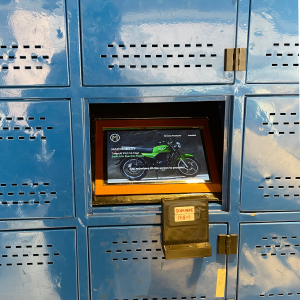
Mazi Mobility has made electric motorcycles and tuktuk taxis affordable and practical in Kenya. The startup offers batteries as a service, providing digitized lockers where owners can leave a low battery and take one with a full charge. The lockers record the transaction and recharge the depleted batteries. Mazi also offers payment plans to buyers.
“Mazi is a Kenyan Mobility as a Service (MaaS) company that is re-imaging mobility through the implementation of an electric vehicle ecosystem in Africa,” Avery Bang at Mulago Foundation says. bu
So far the startup has sold 60 motorcycles that have driven a combined 100,000km. According to their estimate, each bike removes 7kg of carbon dioxide from road travel per day.
“We will be commercializing our swapping stations for use in Nairobi, with 50 planned by end of the year, and nearly 500 bikes sold,” Jesse Forrester, Mazi’s Founder, told E4C. “We will also be testing in new cities in Kenya.”
GenH dam converters to generate hydro power
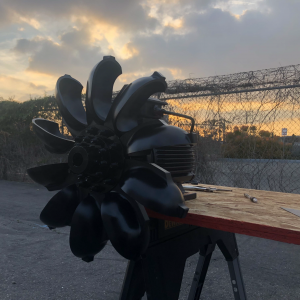
Most of the dams in the United States and around the world are not designed to generate electricity. They’re built for other services, such as flood control and irrigation. GenH is developing technology that can convert those non-powered dams into generators, without the need to invest huge construction costs.
“The technology is relatively simple,” Siddharth Pannir, GenH’s Founder, told E4C. “Siphons transfer water over the dam into a turbine module where the power is generated and processed.”
The systems have a low impact on waterways, plants and wildlife, and they can be installed easily and quickly, Mr. Pannir says.
The result is a “unique, potentially game-changing climate tech,” says James Creel, Senior Program Manager at the American Society of Mechanical Engineers Innovation Showcase. GenH’s product electrifies waterways without hard infrastructure or high construction costs, Mr. Creel says.
In 2022, GenH won the North American regional ISHOW USA, ASME’s global competition and accelerator for hardware-based startups.
The startup is testing pre-commercial prototypes in the US state of Massachusetts, with plans to deploy in three locations this year.
“In 2024 we are looking to electrify whole irrigation districts across all of US Southwest unlocking ~1.4GW of power in rural agricultural California,” Mr. Pannir says.
Permalution fog collection systems
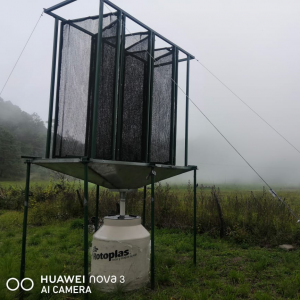
Permalution is developing fog collectors supported by their Fog Atlas and Water Radar that create custom fog maps for choosing the foggiest spots to place the devices.
The “women-led” startup offers “fog capture for water collection to combat climate change,: says Sahar Shamsi, a former Senior Fellow at E4C who recommends Permalution’s technology as a Promising Prototype.
The United Nations predicts that two-thirds of the world will not have enough water by 2030, and the answer is fog, says Tatiana Estevez, CEO of Permalution.
The startup sold four projects in 2022 and is developing three more this year, selling an average of 14 fog collectors per project. At the moment Permalution builds fog capturing modules out of a garage at the rate of four per month, but the team is moving to a larger facility where they can increase production to 20-40 modules per month.
The next steps are the development of an upgraded fog collection membrane and a pilot project for cloud-seeding technology.
“As rain is considered vertical precipitation, fog and clouds are considered horizontal precipitation, and we can collect up to three times more water than with rain,” Ms. Estevez says.
SEM DRAM filtration media for contaminated wastewater
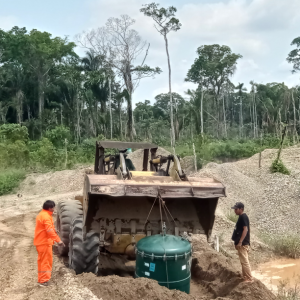 The Scotland, UK-based SEM Energy is developing a patented filtration media made from casava called DRAM. The innovation can strip and recover heavy metals from water used in small-scale gold mining operations. Its application to mining helped DRAM take the highest award granted in the Artisanal Gold Mining Grand Challenge: The Amazon, a distinction shared only with Chemfinity’s membrane, also in this list. Learn more about DRAM at artisanalminingchallenge.com.
The Scotland, UK-based SEM Energy is developing a patented filtration media made from casava called DRAM. The innovation can strip and recover heavy metals from water used in small-scale gold mining operations. Its application to mining helped DRAM take the highest award granted in the Artisanal Gold Mining Grand Challenge: The Amazon, a distinction shared only with Chemfinity’s membrane, also in this list. Learn more about DRAM at artisanalminingchallenge.com.
IDPoor digital tool for poverty relief
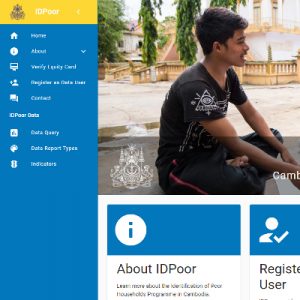
IDPoor is a digital platform developed by Cambodia’s government to support cross-sector collaboration in aid programs for maternal and child health. The program intends to reduce duplication of effort and resources by organizations working to reduce poverty, and to ensure that assistance is provided to households that most need it.
By using IDPoor data for targeting services and assistance to poor households, local authorities and local populations will also more easily accept your organisation’s selection of beneficiaries, because the Lists of Poor Households have already been approved and accepted by them in the participatory identification process that was conducted.
“Digital solutions for governance are increasingly becoming important,” Carolina Rojas, Program Associate at Engineering for Change, said when recommending IDPoor for inclusion in this list.
The platform is supported by Australian Aid and GIZ (Deutsche Gesellschaft für Internationale Zusammenarabeit).
Learn more about IDPoor in E4C’s Solutions Library.
Mama Ope respiratory disease screening device
 The Uganda-based startup Mama Ope is developing a non-invasive tool for accurate, automatic screening of respiratory disease. The device is designed with a special focus on pneumonia screening in low-resource settings using patient vitals.
The Uganda-based startup Mama Ope is developing a non-invasive tool for accurate, automatic screening of respiratory disease. The device is designed with a special focus on pneumonia screening in low-resource settings using patient vitals.
The tool lights green and displays the values when the age-adjusted breathing rate is within the normal range as stipulated by the World Health Organization, and the lung sounds are normal. Built-in clinical decision support provides instant feedback, assisting the care provider in determining a correct diagnosis. All diagnostic support is based on the WHO Integrated Management of Childhood Illness (WHO IMCI) guidelines. The patient data is uploaded to the cloud for remote consultation or telemedicine.
Mama Ope represents “top notch” research and development, with a “strong human-centered design approach,” says James Creel at ASME ISHOW.
Mama Ope was a winner of ASME ISHOW Kenya in 2022.
ThinkRaw India’s solar-powered floating aquaculture pond regulator
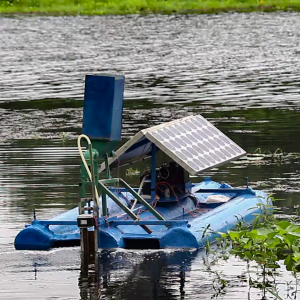
The India-based startup ThinkRaw is solving problems for fish and prawn farmers. The team’s floating aquaculture pond regulator delivers feedings and measures dissolved oxygen levels and the Ph balance of the water, making adjustments accordingly. The device is solar powered and connected to a mobile network. Through a mobile app, farmers can view the data the device collects and fine tune the aeration, feeding and Ph balance.
“We are in the final leg of validation and are ready to scale up,” says Minushri Madhumita, Director of ThinkRaw.
Thus far, the startup has filled an order for six units from India’s National Bank for Agricultural and Rural development (NABARD), Odisha.
ThinkRaw is a winner of the India segment of ASME ISHOW 2022.
Below, the startup presents their innovation in a three-minute video that includes footage of the prototype at work.
